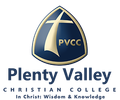Editorial

PVCC’s ‘reading revolution’ is well underway
Education is the world-changer
If you have an interest in following the way education is discussed in Australian media, you may have noticed how often it has become fodder for political point-scoring.
And, of course, people should care about education. It is arguable that no other industry is as widespread and influential. ‘Everyone’ goes to school. If there is a more effective or efficient way to influence a generation of citizens than changing their formative years in school, I’m not aware of it.
Why can’t Aussie kids read good?
You may have caught the buzz following the release of the Grattan Institute’s recent research, revealing that one third of Year 9 students in Australia can’t read.
If you have followed the literacy debate even more closely, you will be aware that there has been widespread and well-documented disagreement about how literacy should be taught for decades. One reputable author even describes it as a ‘war’.
Most recently, one side of this conflict seems to be gaining ground: structured literacy.
Essentially, this approach suggests that we should explain to students how language works, rather than expecting them to just ‘get it’.
If, like me, you grew up in the 80s and 90s, you would have had very little explicit instruction about grammar, spelling, and punctuation. We were told vague things like essays resemble a ‘hamburger’ and to put a comma where you would ‘pause’. We were taught to read by ‘guessing’ a word by looking at everything else around it.
Teachers of my era have had to unlearn the way they were taught. Instead we have had to bring in technical words like ‘clause’, ‘infinitive’, and ‘morpheme’ to the classroom. Initially, we thought students would be daunted by these terms. It turns out, they learn technical terminology in every other part of the curriculum, so it really isn’t that much of a stretch.
And there is no greater pleasure as a teacher than seeing the lightbulbs go off as students realise that they can see the patterns, solve seeming mysteries, and make more sense of their worlds.
PVCC is ahead of the game
I’m proud to say that Plenty Valley has been ahead of this trend by applying clear strategy and moral purpose. The kind of ‘reading revolution’ that the media is calling for has already happened at our school and some others; the ‘new way’ of teaching reading and literacy is our established practice, and we are getting better and better at it.
At the most formative stages of reading development, our Early Years team, led by our curriculum leader, Tonja Craig, has implemented strategies confluent with La Trobe’s Science of Language and Reading (SOLAR). This has been developed throughout the Junior Years.
Tonja writes about the Primary’s integration of structured literacy in the section, Implementing Science of Reading in the Primary below.
Alongside this approach, our Library and Secondary teams (led by Vanessa Carnevale and Kate Rees, respectively) have made significant progress in enculturating a love of reading. Read more in the sections Fostering reading culture in the Library by Vanessa Carnivale and Fostering reading culture in Secondary curriculum by Kate Rees.
How’s it going?
Early results are exciting; we have seen an enormous increase in student outcomes.
- College NAPLAN results show a huge leap forward from 2021 to 2022, which was maintained in 2023. This was especially true compared to similar schools.
- Our internal testing is even more promising; one of our key reading tests shows an increase from 48% of students categorised as ‘fluent’ in 2020 to 84% in 2023.
- Library borrowing numbers are more than double pre-COVID rates.
As reading is a conduit for the rest of the curriculum and almost all other kinds of learning, the potential impact of these improvements will be felt across the board and for years to come.
Most importantly, we should see a huge increase in confidence in our students.
You can be confident that your children are receiving excellent instruction, and you can use this confidence to encourage your kids to love reading, engage whole-heartedly in the school literacy program, and read to them at home. The more you partner with us in this way, the more capable our young people will become.
Daniel Symons
Deputy Principal
Implementing Science of Reading in the Primary
By Tonja Craig, Primary Curriculum Coordinator
The Science of Reading is a worldwide body of compelling cognitive and neuroscientific research that has been gathered to define best practice in Literacy instruction. Over the past two years, our teachers have been engaging in professional development through the La Trobe University SOLAR (Science of Language and Reading) Laboratory. These opportunities have supported teachers to further build their professional knowledge of how to best support students to become proficient in using the English language. This year alone, 18 of our Primary staff will be engaging in these courses.
As a result of this learning, and other teacher research, some of the initiatives that have been introduced to the Primary school include, aligning the Early Years literacy block to include daily explicit instruction in; oral language skill development, phonemic awareness, phonics instruction, fluency reading, vocabulary instruction and knowledge building comprehension activities. These elements have been defined as the Big 6 in Literacy instruction by Associate Professor Delsea Konza (Edith Cowan University) and have gained growing recognition throughout Australia and worldwide as the most impactful elements of an effective Literacy program. Other initiatives that have been introduced at Plenty Valley include the development and resourcing of a take home Decodable reader program for Prep to Year 3 students and the introduction, in 2024, of the DIBELS schedule of assessments throughout the Primary School. This assessment schedule provides teachers with feedback on student progress, and direction for further instruction, across a number of discrete skills that together form the basis for proficient reading. We applaud our teaching staff for the growth mindset and hard work they have displayed in furthering their knowledge in the Science of Reading. A critical element of a Science of Reading aligned Literacy program is that ‘the most is made of every moment’ and we commend our students for the hard work they exhibit daily in working towards developing their English skills.
Fostering reading culture in Secondary curriculum
by Kate Rees, KLA Leader: Languages
As an English faculty, we have spent the past couple of years united in a passion to build reading culture at PVCC after the disturbances of Covid lockdowns. We have been supported by the truly amazing Vanessa Carnevale, a beautifully refurbished library and a generous budget for new novels. Our year 7-9 English classes are spending time fortnightly and year 10 every few weeks in the library, as part of our silent reading programme. Initially, this was not easy for some of our students – they may not speak once a novel is chosen, they may not read online, and they are encouraged to read a variety of genres. However, with perseverance and encouragement, reading engagement has grown and the students now eagerly anticipate their reading sessions and complain if they miss out. The mood in the library during this time is of utter peaceful concentration as children unspool and travel to far lands. Staff enjoy quiet conversations with students about their reading or read alongside the students during these times.
We were fuelled in our determination by the multitude of research which shows both the detrimental effects of children spending too much time online and the wonderful benefits of reading. Outrageously, daily reading strengthens neural pathways, increases one’s ability to empathise, boosts vocabulary, aids concentration and memory, reduces stress and depression, lowers heart rate and blood pressure, helps prevent dementia, aids in evening sleep readiness, and contributes to living longer.
Grab a book and get on board! Parents who read books model healthy ways of winding down. This in turn further supports their children to move from screen time and embrace the wonders of reading time themselves. Make reading a family habit.
Fostering reading culture in the Library
By Vanessa Carnivale, Librarian
If we want to encourage our young people to be life-long learners, they need to be able to read well and access information available to them. A robust and well-resourced library gives young people the chance to foster a love of reading, and at the very least, the opportunity to develop skills that support the acquisition of knowledge that will serve them well into adulthood.
Here in the PVCC libraries, we strive to create an environment that supports a positive reading culture across the school. The emphasis is on reading for pleasure with fiction or nonfiction. Over the past two years, we have seen a notable increase in both the tangible and intangible proofs that point to increased reading engagement in our school. Borrowing statistics plainly affirm this, but they do not tell the whole story. On a daily basis, I have the pleasure of bearing witness to students that are excited about books: students stopping me in the school yard to ask whether their latest reservations are ready to collect, approaching me to recommend new titles, and (my favourite scenario of all) students who once doubted they liked reading, sharing that they have finally caught the ‘bug.’
A number of factors have been and continue to be responsible for increasing reading culture and engagement in our school. A student-led acquisitions approach, the support of teaching staff, a wide-reading program in Secondary, and staff reading challenges that help normalise and model reading for pleasure.
And most impactfully: relationship. Every student matters. Library staff, well-versed in children’s literature and reader’s advisory, strive to get to know an individual student’s interests and tastes. Sharing the excitement of books with this generation is one of our greatest pleasures; we never quite know where a book might have the potential to take someone.

